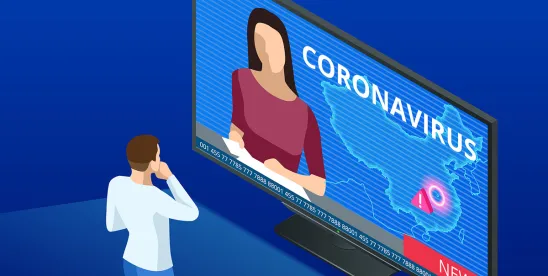This time of unprecedented national crisis caused by COVID-19 has raised many issues for in-house legal departments. The safety of employees, insurance coverage and supply chains have become paramount, but the virus has also impacted the advertising landscape in ways that should not be neglected.
COVID-19 presents a significant, unique and sudden challenge to advertisers. Here are a few advertising ramifications to consider in the wake of this pandemic.
Federal Trade Commission (FTC) Vigilant About COVID-19 Claims
It should surprise no one that unscrupulous businesses are trying to leverage fears surrounding the coronavirus through inappropriate advertising. The FTC is aware of this activity, and it is actively monitoring social media and online marketplaces for fraudulent activity relating to COVID-19 and taking aggressive action.
On March 9, the FTC announced that it and the U.S. Food and Drug Administration (FDA) issued warning letters to “seven sellers of unapproved and misbranded products, claiming they can treat or prevent” COVID-19. The FTC gave those sellers 48 hours to take action to correct the issues and to advise the FTC of their chosen steps toward those remedies.
The FTC has also proactively warned consumers about scammers looking to capitalize on heightened concerns and anxieties over COVID-19. Specifically, the FTC warned about scammers creating websites for fake products and fleecing consumers through false emails, texts and social media posts.
Businesses are not immune. On March 25, the FTC warned businesses about seven COVID-19 B2B scams they are seeing.) These include phishing or other emails claiming to be from the CDC, WHO or other public health offices asking for Social Security Numbers and Tax ID numbers, or tricking recipients into downloading malware that will steal confidential data; “CEO Scams” where a business person receives a spoofed email purporting to come from a high-ranking person in the company directing the person to issue an emergency request to transfer funds or wire money; and efforts by hackers who hope that telecommuting will lead companies to relax their online defenses.
On March 26, FTC Chairman Joseph Simons stated, “[w]e will not tolerate businesses seeking to take advantage of consumers’ concerns and fears regarding coronavirus disease, exigent circumstances, or financial distress.” At the same time, the Chairman advised businesses the FTC is trying to walk a line between reasonableness during the pandemic and vigorous protection against malfeasants, noting, “[t]he FTC will remain flexible and reasonable in enforcing compliance requirements that may hinder the provision of important goods and services to consumers. To be clear, by being flexible and reasonable, I am not suggesting that we will tolerate companies deceiving consumers, using tactics that violate well-established consumer protections, or taking unfair advantage of these uniquely challenging times.”
Claims Involving Cleaning or Healthcare Products or Services
Advertisers should anticipate that the FTC will scrutinize any COVID-19 related claims about cleaning or healthcare products or services, and such, besides falling prey to B2B COVID-19 scams, companies should be careful about claims involving these products or services.
Advertisers making these claims will face an uphill battle trying to show supporting evidence. Any claims relating to a product’s effectiveness against the virus will be viewed as a health-related claim requiring support by competent and reliable scientific evidence. For example, substantiating scientific evidence that a product is effective at killing non-COVID-19 viruses on countertops will likely not substantiate a claim the product is just as effective against COVID-19.
Consumers will expect advertisers to have substantiating evidence for these types of claims, and at this point in the pandemic, it is unlikely that advertisers will have the necessary competent and reliable scientific evidence.
Implied Claims
Implied claims are often pitfalls for advertisers, and during this public health crisis, the ramifications could be larger, particularly in terms of negative publicity. Advertisers of cleaning or healthcare products must consider ways that messaging about their products’ attributes could imply unsupported claims about effectiveness against COVID-19.
Superiority claims, particularly with respect to products or services in demand in this COVID-19 pandemic, will also be scrutinized more closely. A March 25 FTC complaint, In re Federal-Mogul Motorparts LLC, which involves an advertiser’s claim its brake pads stopped vehicles 50 feet sooner than competing brake pads unsubstantiated, reminds everyone that advertisers need “sound proof,” and that tests to support superiority claims must track how the products are used in the real world.
Advertising Contracts, Including Social Influencer Agreements
The looming economic downturn has caused many corporations to slash their advertising budgets. After Twitter withdrew its revenue forecast, CNN reported that many businesses are shutting down their advertising, particularly in the digital realm.
Companies should consider reviewing their advertising contracts, particularly their social influencer agreements, to make sure they understand the financial ramifications, if any, of switching off the advertising spigot.
Avoiding Gaffes Involving COVID-19
Advertisers should also make it a best practice to review advertising that may have been created before the pandemic took center stage to ensure that it does not contain messaging which could be considered inappropriate or insensitive in light of COVID-19.
Advertisers should also review content created by their social influencers to scrub their messaging for content that suddenly has become undesirable.
Take the question of coffee shops’ refilling personal mugs. On March 4, Starbucks announced it was “pausing the use of personal cups” in its stores as a precautionary measure to combat COVID-19. At least one smaller coffee shop business has followed suit, with its owner commenting “if they’re sick and they hand their cup to my people to refill and we spread it to everyone we touch all day, that’s not good.” Nevertheless, Panera continues to run a television commercial entitled “Sunrise” to promote its unlimited coffee subscription. The ad concludes with a crowd of people congregating outside a Panera shop all waving personal cups they want the Panera employees to refill.
Helping the Fight Against COVID-19
Many companies are considering how to help the nation’s fight against this coronavirus pandemic, for example, there are reports of corporations that are switching to manufacture badly needed products for healthcare providers.
In tandem, an advertiser’s social media platforms could be repurposed to support a particular company’s COVID-19 related messaging. From the perspective of advertising, existing advertising buys could be repurposed to run public service announcements developed with local governmental agencies. Social influencers could be asked to run messaging about social distancing or in support of healthcare providers, charitable organizations and small businesses who are struggling.




 />i
/>i

